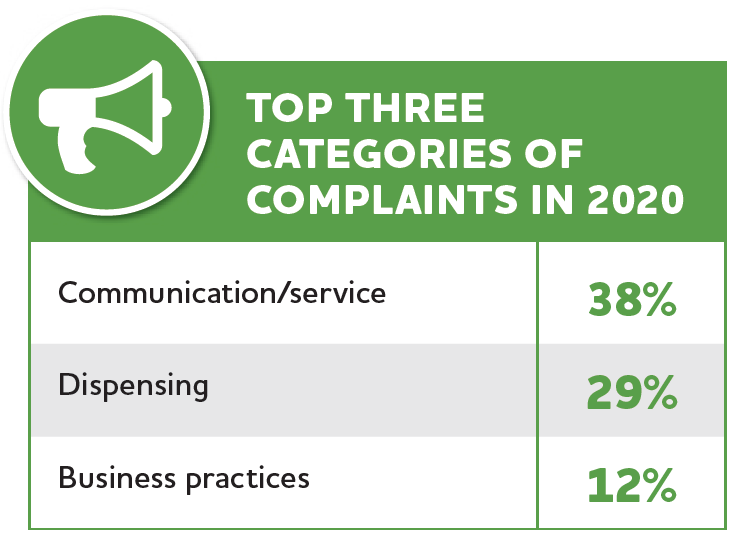The Ontario College of Pharmacists’ legislated mandate is to serve and protect the public by holding registrants accountable to established legislation, Standards of Practice, Code of Ethics and other policies and guidelines related to pharmacy practice. Registrants of the College (also known as Members) include Pharmacists, Pharmacy Technicians, Pharmacy Interns, and Pharmacy Students.
The College’s Complaints and Reports process exists to protect the public, but it also provides registrants with opportunities to evaluate and improve their practice. A complaint may be filed against a registrant if a patient, caregiver, another healthcare provider or a member of the public has concerns related to the care or services provided by the registrant. This article outlines the College’s complaints process, establishes how the College names registrants in complaints, and provides guidance on the prevention and management of complaints.
COMPLAINTS PROCESS
A complaint file is created once the College receives information regarding a concern in writing through the College’s Online Complaint Form or another form of media (e.g., email, a mailed letter, or a fax). A complaint submission must identify the Complainant and the registrant(s) involved, and it must clearly outline the concern. The College does not accept anonymous complaints. In cases where the information required to initiate a complaint is not available, the College will ask the Complainant for additional information. The College may also request information and records from a community pharmacy’s Designated Manager or a hospital’s Pharmacy Manager to identify the registrant(s) involved in the concern(s).
If more than one registrant is named in a complaint, each registrant receives their own complaint file and the complaints will be investigated in parallel. Registrants will have an opportunity to review and comment on the responses provided by other registrants involved in the complaint. The College’s complaints process is confidential, so registrants are expected to maintain the confidentiality of their Complainant and any other registrant(s) involved. College staff fully and impartially investigate each complaint.
The Pharmacy Act, 1991 establishes the role and responsibilities of the College’s registrants based on their registration class and is used by the College in considering which registrant to name in a complaint. Registrants may proactively prevent complaints by learning about the duties and responsibilities expected of them and by reviewing past complaint and discipline cases. Another strategy that registrants may utilize to prevent complaints is to actively identify, assess, prioritize and manage risk during practice.
For example, at clinical verification and product check, registrants may identify high-alert medications and ensure that they receive independent checks, mandatory patient education, follow-up calls, and adequate handover of care during staff change to mitigate risk. Proactive management and effective communication may prevent a medication incident from escalating to a complaint, and the following framework can be utilized for this strategy.
Several resources regarding the complaints process have been developed by the College, including a web page, an infographic, and a video

MANAGEMENT RESPONSIBILITIES
While each pharmacy professional has an individual responsibility in providing high quality patient care, a pharmacy’s Designated Manager is additionally responsible for the supervision and training of regulated and unregulated pharmacy staff. Unregulated pharmacy staff includes pharmacy assistants, pharmacy clerks, pharmacy technician students, cashiers, volunteers, and other pharmacy employees that are not registered with the College. Furthermore, the pharmacy’s Designated Manager is also responsible for developing, applying, and monitoring compliance with the policies and procedures followed by regulated and unregulated staff. A Designated Manager may be named in a complaint, even if they were not physically present when the incident occurred, if the pharmacy’s policies and procedures contributed to the incident.
Similarly, a pharmacy’s Designated Manager may be named in a complaint related to unregulated pharmacy staff, even if the Designated Manager was not physically present when the incident occurred. The College’s expectation is that the Designated Manager trains unregulated staff to a degree in which they can provide high quality pharmacy services without direct supervision. To prevent concerns regarding unregulated pharmacy staff, Designated Managers are encouraged to develop and facilitate a training program for new staff. Designated Managers may also provide regular reviews and retraining sessions if they feel that their pharmacy’s policies and procedures are not consistently utilized by regulated and unregulated pharmacy staff.
RESPONDING TO COMPLAINTS
If a complaint is filed, registrants are encouraged to cooperate with the College in compiling pharmacy documents and submitting statements for the Inquiries, Complaints and Reports Committee (ICRC) to review. By consistently documenting patient education, clinical/technical decision-making process, and medication incidents, registrants will be able to provide the College with key information related to the complaint.
As part of the College’s Assurance and Improvement in Medication Safety (AIMS) program, pharmacy professionals are expected to record all incidents and select near misses in the AIMS Pharmapod Platform. Furthermore, registrants are encouraged to analyze these incidents to develop strategies aimed at preventing similar incidents in the future. The College does not have access to a pharmacy’s incident level data recorded in the platform. However, if a registrant wishes to submit information regarding an incident/near miss which is the subject of a complaint they may do so by providing a copy of the incident/near miss form available on the AIMS Pharmapod platform. Alternatively, registrants may use any form that captures the necessary incident details to be provided to the College; an example is the College’s Dispensing Errors Incident Form.
Some registrants find it helpful to proactively take part in remedial education tailored to the concern mentioned in the complaint, and a record of this education’s completion may be submitted for review by the ICRC.
If registrants need extra time to respond to a complaint, they may request an extension. Registrants may seek legal counsel at any time during the complaints process and in the review of an ICRC decision by the Health Professions Appeal and Review Board (HPARB). As well, registrants may access services and resources provided by the Ontario Pharmacy Health Program (OPHP) if they are experiencing stress or mental health issues during the complaints process or at any other time.
REPORTING INFORMATION
If anyone has a concern about the conduct or competence of a pharmacy professional, they can report information to the College without filing a formal complaint. Information reported should include details of the concerns, the name of the pharmacy professional, as well as the reporting individual’s contact information. The College will assess the concerns and take appropriate action. The individual who reported the information may be contacted and asked to provide additional information. Generally, that individual will not be engaged in the process and will not receive notification of the outcome. During the course of an investigation, their identity may become known to the pharmacy professional being investigated. Like Complaints, Reports cannot be submitted anonymously.













